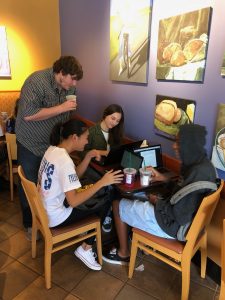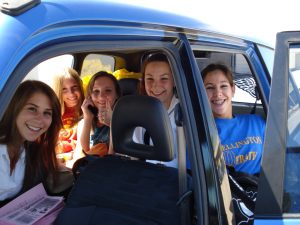
The time you invest in Wellington’s program depends on how much you want to do and at what level. If you want to do well in many events at a national level, you will have to spend a great deal of time. Squad meetings, practice debates, and practice speeches are held regularly; potential tournaments are scheduled on many weekends. This is time well spent as an intellectual experience that reinforces coursework.
Thousands of students have distinguished themselves in forensics while maintaining their grades, their social lives, and other activities that interested them. Your classes must come first in time allocation, but if you are active in the program it could take the second greatest amount of your time during fall and winter. For the student who wants to engage in an exciting and intellectually challenging activity, the time commitment is extremely worthwhile.
That being said, the Wellington Speech & Debate Team is no less demanding or rigorous than athletics, band, drama, etc.. We expect students to attend practice and demonstrate the necessary commitment to attend tournaments. Because our season is virtually year-long, students who divide their extracurricular time will necessarily face occasional conflicts in schedules and availability. Parents should work with their students to determine priorities. A tentative tournament schedule will be available early in the fall, and commitments that are made to the speech and debate team should be honored. Students may have to make choices about their other activities and study loads.
 The minimum class requirement is 2 tournaments per semester for first-year novice students, and 3 tournaments per semester for varsity. At least one tournament each quarter is required. Students may choose to compete at more than the minimum (and are encouraged to do so). Competing at more than the minimum offers more educational benefits, opportunities to earn a varsity letter and additional National Speech & Debate Association degrees, and potentially a spot or spots in post season tournaments.
The minimum class requirement is 2 tournaments per semester for first-year novice students, and 3 tournaments per semester for varsity. At least one tournament each quarter is required. Students may choose to compete at more than the minimum (and are encouraged to do so). Competing at more than the minimum offers more educational benefits, opportunities to earn a varsity letter and additional National Speech & Debate Association degrees, and potentially a spot or spots in post season tournaments.
Tournaments are 40 percent of a student’s grade, so it is extremely difficult to get a good grade if students do not compete. We view tournaments like tests. Students who take no tests do not pass other classes. Debate is no different. The nice thing about debate is, families get to plan their tournament schedule ahead of time so there are no surprises as the semester progresses. If there are extraordinary, extenuating circumstances, we will work with a student. But a simple failure to plan ahead is not sufficient to have this requirement waived.
If a student doesn’t win any rounds at tournaments, or trophies, this will not impact grades. Tournament points are based purely on whether or not students compete, not whether they win or lose. Winning is its own reward, and generally functions as a motivator. Grades will also be based on assignments handed out in class, practice rounds in class and after school, and research assignments. It is entirely possible for a student to get an “A” without ever winning a debate. However, that is unlikely, because if they do everything we teach them, they will find some success.